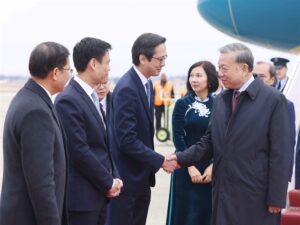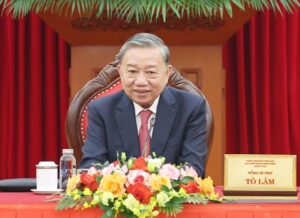Hanoi Convention against Cybercrime Signed at High-Level United Nations Conference in Vietnam

Hanoi, The Gulf Observer: The Signing Ceremony and High-Level Conference of the United Nations Convention against Cybercrime — officially titled the Hanoi Convention — were solemnly held on Friday at Vietnam’s National Convention Centre under the theme “Countering Cybercrime – Sharing Responsibility – Securing our Future.”
The ceremony was chaired by Vietnamese State President Lương Cường, with the participation of United Nations Secretary-General António Guterres and high-level representatives from around 110 countries and numerous international organisations, including UN agencies, regional institutions, financial bodies, and leading experts in cybersecurity and international law.
Prior to the opening session, President Cường chaired the official welcome ceremony and posed for a group photograph with the heads of participating delegations. He, along with Secretary-General Guterres and other dignitaries, visited a photo exhibition organised by the Vietnam News Agency (VNA) showcasing Vietnam’s people, development achievements, and the nation’s positive contributions to the United Nations and global cooperation efforts.
In their opening speeches, President Cường and Secretary-General Guterres underscored the importance of global solidarity and shared responsibility in addressing the escalating threats of cybercrime. Following the remarks, representatives of 60 countries participated in the formal signing of the Hanoi Convention in a ceremony administered by the United Nations Office for Legal Affairs (OLA).
Initiated by the UN in 2019, the Convention against Cybercrime was conceived from the urgent need to create a comprehensive international legal framework to tackle emerging global challenges in non-traditional security, climate change, and sustainable development. After five years of negotiations, the UN General Assembly unanimously approved the convention on December 24, 2024.
Comprising nine chapters and 71 articles, the convention offers a holistic approach to combating cybercrime while safeguarding human rights. It seeks to modernise criminal investigation methods for the digital age, strengthen international cooperation, and address the complex technical and legal dimensions of cyber threats.
Vietnam has played an active and proactive role throughout the drafting process, hosting multiple international workshops with the participation of experts from the UNDP, WHO, and UNODC. These discussions helped shape the convention’s content, focusing on cybersecurity, environmental protection, and poverty reduction.
Notably, Vietnam’s proposals—such as establishing a support mechanism for least developed countries and integrating climate change considerations—received widespread international endorsement.
The UN’s decision to select Hanoi as the venue for the signing marks a historic milestone in Vietnam’s multilateral diplomacy and nearly five decades of partnership with the United Nations. It is the first time that a global multilateral treaty addressing a critical international issue has been signed in Vietnam.
The selection reflects Vietnam’s growing international stature and credibility as a champion of multilateralism and a proactive contributor to global digital governance and cybersecurity. It also reinforces the country’s commitment to its digital transformation strategy, signaling a new era of national prosperity and innovation.
As part of the event’s framework, a plenary session co-chaired by Prime Minister Phạm Minh Chính and UN Secretary-General António Guterres will be held, alongside a series of bilateral meetings and side events on issues including protecting citizens in the digital era, global cooperation against online scams, capacity building for cybercrime prevention, and sharing best practices for investigating electronic evidence and combating virtual asset-related money laundering.
The Hanoi Convention represents a landmark in global efforts to ensure a safer and more secure digital future for all nations.


